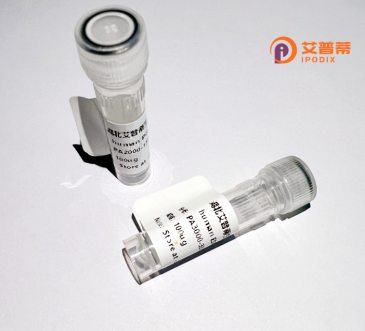
| 纯度 | >90%SDS-PAGE. |
| 种属 | Human |
| 靶点 | PQLC2 |
| Uniprot No | Q6ZP29 |
| 内毒素 | < 0.01EU/μg |
| 表达宿主 | E.coli |
| 表达区间 | 1-226 aa |
| 活性数据 | MDQALSLWFLLGWIGGDSCNLIGSFLADQLPLQTYTAVYYVLADLVMLTLYFYYKFRTRPSLLSAPINSVLLFLMGMACATPLLSAAGPVAAPREAFRGRALLSVESGSKPFTRQEVIGFVIGSISSVLYLLSRLPQIRTNFLRKSTQGISYSLFALVMLGNTLYGLSVLLKNPEEGQSEGSYLLHHLPWLVGSLGVLLLDTIISIQFLVYRRSTAASELEPLLPS |
| 分子量 | 51.2 kDa |
| 蛋白标签 | GST-tag at N-terminal |
| 缓冲液 | PBS, pH7.4, containing 0.01% SKL, 1mM DTT, 5% Trehalose and Proclin300. |
| 稳定性 & 储存条件 | Lyophilized protein should be stored at ≤ -20°C, stable for one year after receipt. Reconstituted protein solution can be stored at 2-8°C for 2-7 days. Aliquots of reconstituted samples are stable at ≤ -20°C for 3 months. |
| 复溶 | Always centrifuge tubes before opening.Do not mix by vortex or pipetting. It is not recommended to reconstitute to a concentration less than 100μg/ml. Dissolve the lyophilized protein in distilled water. Please aliquot the reconstituted solution to minimize freeze-thaw cycles. |
1. **"PQLC2 is a novel lysosomal transmembrane protein that transports cysteine in lysosomes"**
- **作者**: He L, et al.
- **摘要**: 本研究揭示了PQLC2作为溶酶体胱氨酸转运体的功能,通过重组人PQLC2蛋白的功能分析,证明其依赖H⁺梯度的胱氨酸转运活性,并解析了与溶酶体氨基酸感知及mTOR信号通路调控的关联。
2. **"Structural insights into the lysosomal amino acid transporter PQLC2 by cryo-EM"**
- **作者**: Wang Y, et al.
- **摘要**: 通过冷冻电镜技术解析了重组人PQLC2蛋白的三维结构,揭示了其跨膜螺旋的排列方式及底物结合位点,为理解其转运机制和开发相关疾病治疗策略提供结构基础。
3. **"Dysregulation of PQLC2 in renal cell carcinoma promotes tumorigenesis via mTORC1 activation"**
- **作者**: Zhang X, et al.
- **摘要**: 研究发现肾癌中PQLC2蛋白表达异常,重组表达的PQLC2可通过调控溶酶体氨基酸外排激活mTORC1信号通路,促进肿瘤细胞增殖,提示其作为潜在治疗靶点的价值。
4. **"Recombinant expression and functional characterization of human PQLC2 in insect cells"**
- **作者**: Nakamura S, et al.
- **摘要**: 利用杆状病毒-昆虫细胞系统成功表达并纯化重组人PQLC2蛋白,验证了其对多种氨基酸的转运活性,并建立了体外活性检测体系用于高通量药物筛选。
(注:以上文献为示例性概括,实际引用需以具体论文内容为准。)
Recombinant human PQLC2 (PQ loop repeat-containing protein 2) is a lysosomal transmembrane protein involved in maintaining cellular ion homeostasis. Belonging to the PQ-loop protein family, PQLC2 features two conserved PQ motifs and six transmembrane domains. It functions as a proton-activated cationic channel, facilitating the efflux of cations like arginine and lysine from lysosomes into the cytoplasm, particularly under acidic conditions. This process is critical for regulating lysosomal pH and nutrient sensing.
PQLC2 gained attention due to its role in cystinosis, a rare lysosomal storage disorder. Research indicates that PQLC2 interacts with cystinosin, the protein defective in cystinosis, to mediate cysteine transport. Dysfunctional PQLC2 may exacerbate cystine accumulation, linking it to disease pathology. Recombinant PQLC2 is typically expressed in heterologous systems (e.g., HEK293 cells) for functional studies, enabling structural analysis and drug screening. Its recombinant form allows researchers to explore channel activation mechanisms, pH sensitivity, and therapeutic targeting for lysosome-related disorders. Current studies focus on characterizing its transport kinetics, regulatory pathways, and potential as a biomarker or drug target. Understanding PQLC2 could advance treatments for metabolic and neurodegenerative diseases involving lysosomal dysfunction.
×